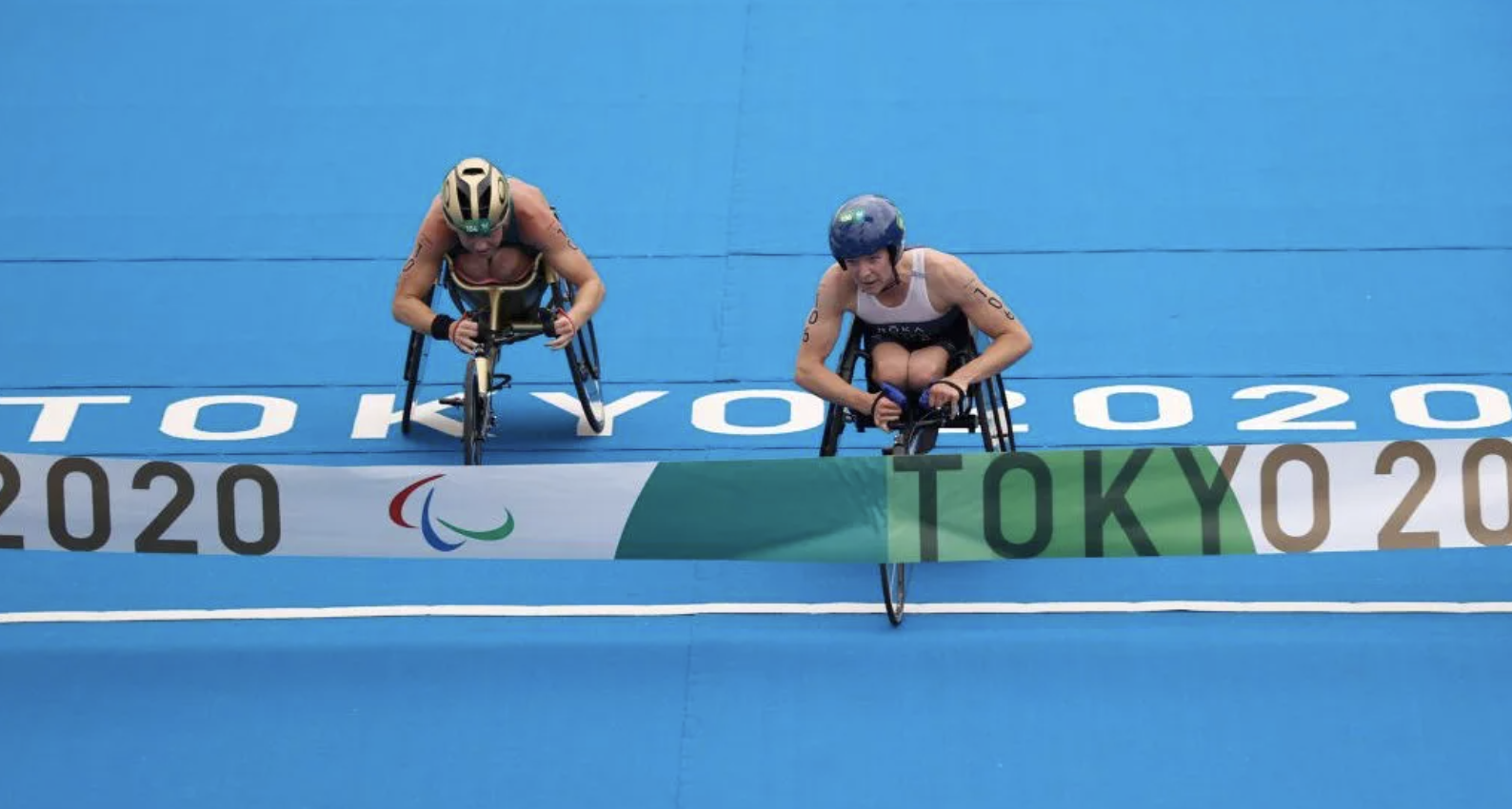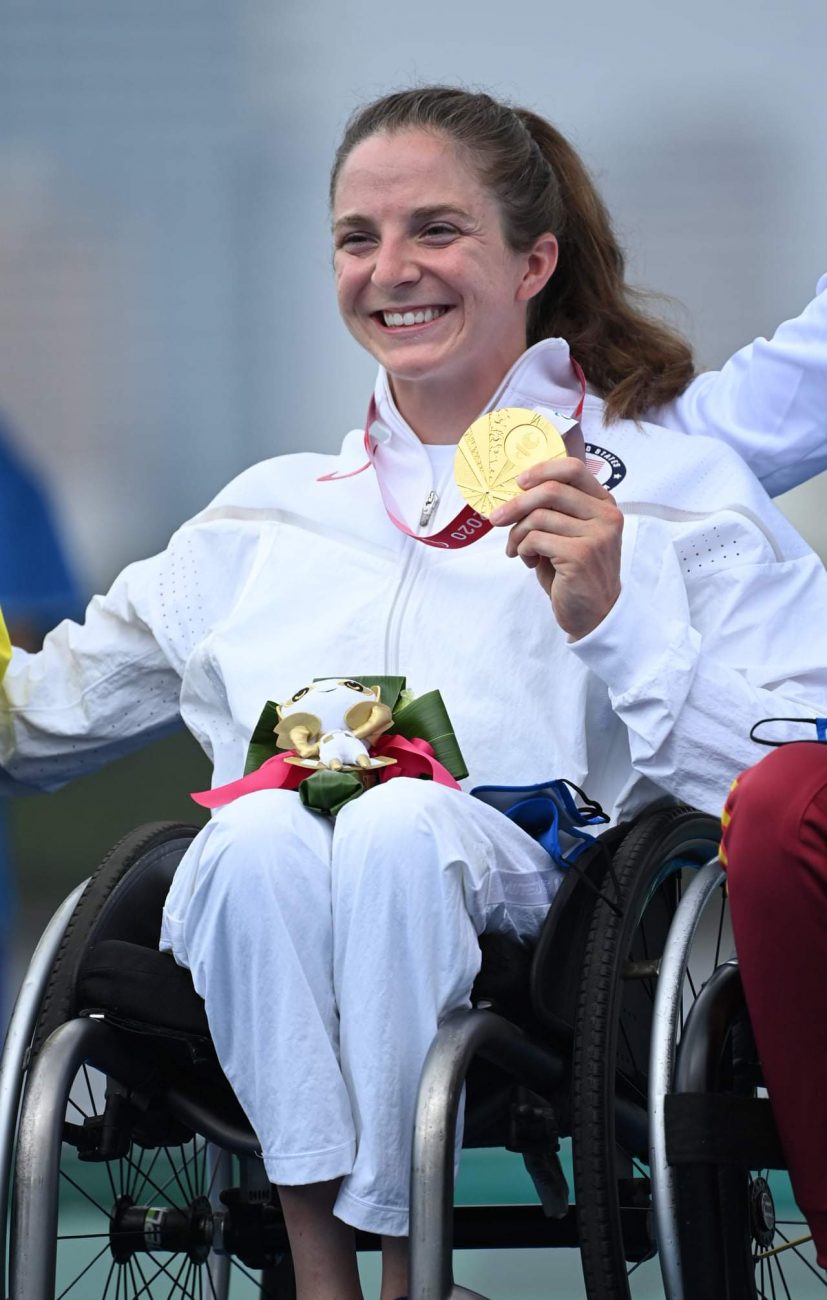
If you didn’t catch the ending of the triathlon during the Tokyo Paralympics, prepare for the chills. Spoiler alert: in an all out, last gas effort in the final meters, dual-season athlete Kendall Gretsch edged out Australia’s Lauren Parker by one second for a Gold Medal victory.
This is Gretsch’s third Olympic gold, alongside the two she earned during the 2018 PyeongChang Paralympic Games, first in the 6-kilometer biathlon sitting sprint and again in the 12 k cross-country distance race. Her achievement in Tokyo makes her the fifth American — third female — to win a Gold Medal at both the summer and winter Paralympic Games.
Taking a step back, triathlon was first added to the summer Paralympic schedule in 2016, however, only a subset of the nine competition classification categories were allowed to compete. Gretsch was born with spina bifida, which is the result of a neural tube defect during fetal development, impairing her spine and spinal cord. While she walks with crutches, she competes in the PTWC2 (paratriathlon wheelchair) division, meaning after the swim, she races the bike leg on her handcycle, before transitioning into a racing wheelchair for the run. The Tokyo games were the first opportunity for the two PTWC categories to compete.
FasterSkier spoke with Gretsch in April of 2020 when the news first broke that the Tokyo Olympics were definitely postponed until 2021 due to the ongoing COVID-19 pandemic. As we discussed, this leaves just over six months for athletes like Gretsch who compete in both winter and summer sports to prepare for the upcoming Beijing Paralympics, which begin on March 4th, 2022. Following up to learn more about her experience in Tokyo, FasterSkier reconnected with Gretsch on a call to hear how she is mentally and physically recharging before ramping up her training for the winter season.

First, let’s go beyond the highlight reel to learn more about the Gold Medal day.
Because Gretsch is in the lesser impaired category, she starts at a deficit of four minutes and four seconds behind competitors in the PTWC1 division. The clock starts running at the same time for all athletes, and the first woman across the line is the winner, regardless of starting wave. Among the women in the PTWC1 division was Gretsch’s mark, Parker.
The Australian has a lengthy resume in elite triathlon, including a second place finish in the 2015 Kona World Championships as an able-bodied athlete. After recovering from a serious accident in 2017 that left her with permanent spinal cord damage, Parker began competing in paratriathlon, quickly ascending the ranks and ending the 2019 season with a commanding victory at the ITU World Championships.
While Gretsch is accustomed to the staggered start in her event, she explained that it does change the tactics compared to a mass start competition.
“The goal is to consistently make up ground,” Gretsch explained in a call. “So I wouldn’t say it’s a very tactical race, and that you’re like, waiting to time your move, or finding the right spot on the course to make a move. You’re basically just going all out in trying to [catch the earlier starters] by the end of the race, hoping you can make up that four minutes.”
The PTWC race includes a 750 meter swim, a four-lap 20 km bike, and a four-lap 5 km run, which Gretsch completed in a total time of 1:06:25. She explained that the many laps during the bike and run allowed her coaches to regularly provide her with feedback of where she stood relative to the leaders.

Gretsch began making up time right away. She was 35 seconds faster than Parker in the swim, and left the second transition from bike to run just a minute and twenty seconds back. While she acknowledged that the percentage of the race that happens on the bike makes it an opportunity to make a dent in the deficit, she also explained that her progress during that leg surprised her.
“It did play out a little bit differently, in my mind, than I thought it was going to,” she shared. “Usually I can make up a little bit more time on the swim, and then I know that Lauren is a super strong biker. So going into this race beforehand, my goal was to make up some amount of time on the swim and really just not lose time to her on the bike. So yeah, I was really pleased that I was able to make up as much time out on the bike as I did in this race. Especially because she had an amazing swim.”
Sometimes good results come from races where we never feel our best and may feel surprised by the outcome. Likewise, there are the days we dream about where everything is clicking from start to finish and we know from the gun that it will be a good day. For Gretsch, there were elements of both.
“I would say my swim was average. And then as soon as I got onto the bike, I knew that it was a really good day for me and that I was feeling really strong. So I kind of just told myself throughout the race — I knew that [I was giving] everything I had on that day, and could push really hard. And regardless of what happened, I knew it was gonna be a really close race. If I passed her, if I didn’t pass her; I just knew that it was going to be a really exciting race to watch. So that was kind of cool to have that recognition during the race that regardless of what happens, I wasn’t going to have any regrets about the race because I knew I was going as hard as I could, and that it was going to be an exciting race for people to watch.”

With three golds and a silver from ITU World Championships, five USA Paratriathlon national titles, and a slew of international podiums, Gretsch is no stranger to high level competition. However, the Paralympics is the Paralympics; held as the pinnacle of sport in the United States.
Grestch spoke about her mindset approaching the Games in terms of managing expectations she feels, whether internal or external, and her approach to the mental strain of competing in Tokyo.
“Going to the Paralympics is something that I’ve wanted to do ever since I got involved in triathlon, so finally having the opportunity this year in Tokyo — this race was just so important to me. And I maybe underestimated the mental drain going into the race. It’s such a mental roller coaster where, you know, you feel great some weeks, and you feel bad on some days. And it’s hard, because it just feels like your whole — everything you’ve done for the past five years, even longer than that has just been leading to this one day. So I think for me, it was just such a huge relief that I did have a day where I felt so strong. And again, if it was first or second, I was going to be happy with the outcome either way, because I knew that I had done everything I could in the preparation leading up into the games, and that was everything I had on that day.”
Circling back to the postponement of the Games, Gretsch reflected on whether or not the decision to move the games to 2021 was a benefit or detriment.
“I think the postponement really worked in my favor. I had gotten all new equipment for my bike and the run in October of 2019. So just having that extra year gave me time to work with that equipment and dial that in, and it also gave me the opportunity to take a step back and maybe rethink how I was training. Specifically, I think, the run and bike became two really big focuses for me. And so just having that extra year to be able to change things up, try something new and not have to worry about risking a race season because if something didn’t work, it wasn’t as big of a risk.”
Considering the elongated buildup for Tokyo and the brief window to take a break before preparing for Beijing, Gretsch explained that her mind more so than her body needed to recharge. Our call took place following a short vacation.
“Obviously, you need the physical recharge, and that’s something that I’m familiar with from going between the seasons every single year. But the mental drain of the Games was a lot bigger, I think, than just a regular summer season. So the mental break that I took was so important for me. Now that I’m starting to get back into [ski training] now, I’m just excited about it and ready to go and not, you know, carrying any fatigue this week from that.”

At the moment, changing gears looks like a steady reintroduction of ski specific elements to her training, including shooting and double poling. Gretsch, who is based at the Olympic and Paralympic training center in Colorado Springs, also attended a 10-day USA Para Nordic training camp in the ski tunnel in Oberhof in late September.
“Since I don’t have access to snow yet [in Colorado], introducing some time on the Ski Erg again, getting range time when I can. So yeah — just trying to get back into the ski motions before leaving full time for the Winter, around the end of October or early November.”
Finally, Gretsch reflected on her experience in the COVID restriction shrouded Games in Tokyo compared to her previous Winter Olympic experiences.
“It’s weird to think about because — if I thought about what the environment was, or if someone told me that this is what it was going to be like four years ago, I think I would have said, ‘Oh, wow! That’s so crazy to imagine.’ But we’ve been living through COVID for 18 months, almost two years now. And so it strangely feels kind of normal.”
FasterSkier will continue to follow the Para Nordic team’s whirlwind build up to the Beijing Games.
Rachel Perkins
Rachel is an endurance sport enthusiast based in the Roaring Fork Valley of Colorado. You can find her cruising around on skinny skis, running in the mountains with her pup, or chasing her toddler (born Oct. 2018). Instagram: @bachrunner4646



